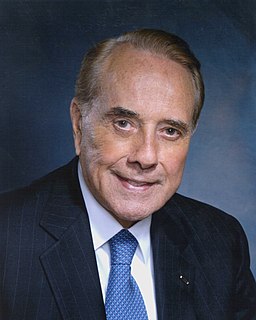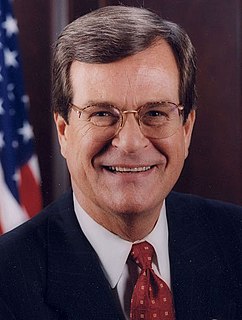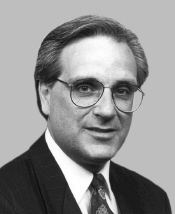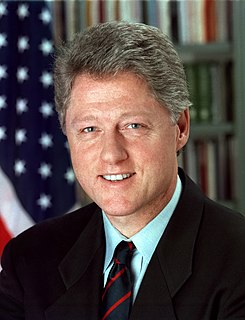
Robert Patrick Casey Sr. was an American politician from Pennsylvania. A member of the Democratic Party, he served as the 42nd Governor of Pennsylvania from 1987-95. He previously served as a state senator (1963–68) and Auditor General of Pennsylvania (1969–77).

The 2000 United States Senate elections, was held on November 7, 2000. The elections coincided with other federal and state elections, including the presidential election which was won by Republican George W. Bush. It featured a number of fiercely contested elections that resulted in a victory for the Democratic Party, which gained a net total of four seats from the Republican Party. This election marked the first election year since 1988 where Democrats made net gains in the Senate.

The 1994 United States Senate elections were elections held November 8, 1994, in which the Republican Party was able to take control of the Senate from the Democrats. In a midterm election, the opposition Republicans held the traditional advantage. Congressional Republicans campaigned against the early presidency of Bill Clinton, including his unsuccessful health care plan.

The 1998 United States Senate elections were held on November 3 and seen as an even contest between the Republican Party and Democratic Party. While the Democrats had to defend more seats up for election, Republican attacks on the morality of President Bill Clinton failed to connect with voters and anticipated Republican gains did not materialize. The Republicans picked up open seats in Ohio and Kentucky and narrowly defeated Democratic incumbent Carol Moseley Braun (Illinois), but these were cancelled out by the Democrats' gain of an open seat in Indiana and defeats of Republican Senators Al D'Amato and Lauch Faircloth. The balance of the Senate remained unchanged at 55–45 in favor of the Republicans. With Democrats gaining five seats in the House of Representatives, this marked the first time since 1934 that the out-of-presidency party failed to gain congressional seats in a mid-term election, and the first time since 1822 that the party not in control of the White House failed to gain seats in the mid-term election of a President's second term. These are the last senate elections that resulted in no net change in the balance of power.

The 1988 United States Senate elections was an election for the United States Senate in which, in spite of the Republican victory by George H. W. Bush in the presidential election, the Democrats gained a net of one seat in the Senate. Seven seats changed parties, with four incumbents being defeated. The Democratic majority in the Senate increased by one from 54/46 to 55/45.

The 1986 United States Senate elections was an election for the United States Senate in the middle of Ronald Reagan's second presidential term. The Republicans had to defend an unusually large number of freshman Senate incumbents who had been elected on President Ronald Reagan's coattails in 1980. Democrats won a net of eight seats, defeating seven freshman incumbents and regaining control of the Senate for the first time since January 1981. The party not controlling the presidency gained seats, as usually occurs in mid-term elections.

The 2006 United States Senate elections were held on November 7, 2006, with all 33 Class 1 Senate seats being contested. The term of office for those elected in 2006 ran from January 3, 2007, to January 3, 2013. Prior to the election, the Republican Party controlled 55 of the 100 Senate seats.

The 2006 United States Senate election in Pennsylvania was held November 7, 2006. Incumbent Republican Rick Santorum ran for re-election to a third term, but was defeated by Bob Casey, Jr., the son of Former Pennsylvania governor Bob Casey Sr. Casey was elected to serve between January 3, 2007 and January 3, 2013. Santorum trailed Casey in every public poll taken during the campaign. Casey's margin of victory was the largest ever for a Democratic Senate nominee in Pennsylvania, and the largest margin of victory for a Senate challenger in the 2006 elections. When Casey took office two months later, he became the first Democrat sworn in for a full term in the Senate from Pennsylvania since Joseph S. Clark Jr. won a second term in 1962.
Barbara Hafer is an American politician from the Commonwealth of Pennsylvania. Initially a member of the Republican Party, she served as a member of the Allegheny County Board of Commissioners from 1984 to 1989, as the Auditor General of Pennsylvania from 1989 to 1997 and as the Treasurer of Pennsylvania from 1997 to 2005.
The Republican Party of Pennsylvania, commonly known as the PA GOP, is based in Harrisburg in the United States state of Pennsylvania. It is affiliated with the Republican Party of the United States.

The 1991 United States Senate Special election in Pennsylvania was held on November 5, 1991. Incumbent Democratic U.S. Senator Harris Wofford won the special election that was held because of the death of Republican Senator John Heinz on April 4 of that year. Wofford was appointed by Governor Bob Casey to serve as Senator until the special election which he subsequently won. Major-party candidates for this election were chosen by party committees, as the vacancy had happened too late for a primary to be held.

The 2000 United States Senate election in Pennsylvania was held on November 7, 2000. Incumbent Republican U.S. Senator Rick Santorum won re-election to a second term. As of 2019, this is the last time the Republicans have won the Class 1 Senate Seat from Pennsylvania.

The 2004 United States Senate election in Pennsylvania was held on November 2, 2004. Incumbent Republican U.S. Senator Arlen Specter won re-election to a fifth term.

The 1994 United States Senate election in Tennessee was held November 8, 1994. Incumbent Democratic U.S. Senator Jim Sasser ran for re-election to a fourth term, but was defeated by Republican nominee Bill Frist.
John Brabender is a prominent Republican political consultant. He earned a degree in from Gannon University and an MBA from Cleveland State University.

The 1994 United States Senate election in Washington was held November 7, 1994. Incumbent Republican U.S. Senator Slade Gorton won re-election to a second consecutive term. As of 2019, this is the last Senate election in Washington won by a Republican.

The 1994 United States Senate election in New York was held November 8, 1994. Incumbent Democratic U.S. Senator Daniel Patrick Moynihan won re-election to a fourth term.

The 2012 United States Senate election in Pennsylvania was held on November 6, 2012, alongside a presidential election, other elections to the United States Senate in other states, as well as elections to the United States House of Representatives and various state and local elections. Incumbent Democratic U.S. Senator Bob Casey, Jr. ran for and won re-election to a second term, defeating Republican nominee Tom Smith, and Libertarian nominee Rayburn Smith.

The 1988 United States Senate election in Pennsylvania was held on November 8, 1988. Incumbent Republican U.S. Senator H. John Heinz III successfully sought re-election to another term, defeating Democratic nominee Joe Vignola.

























